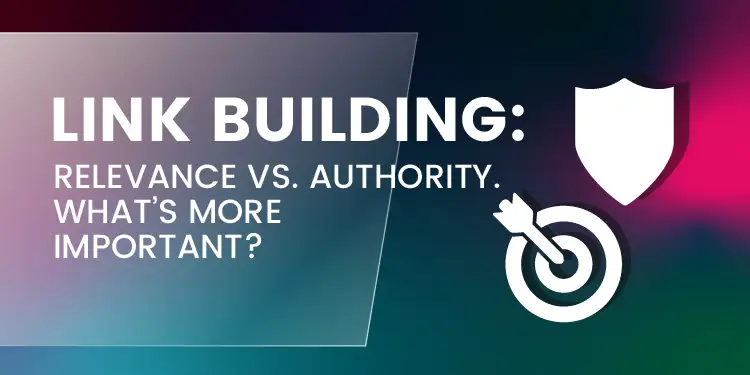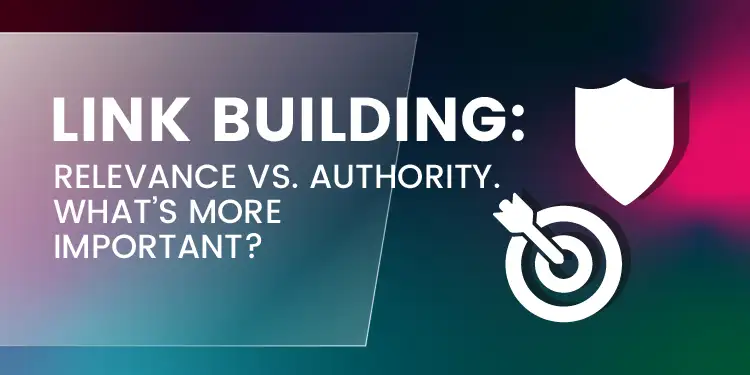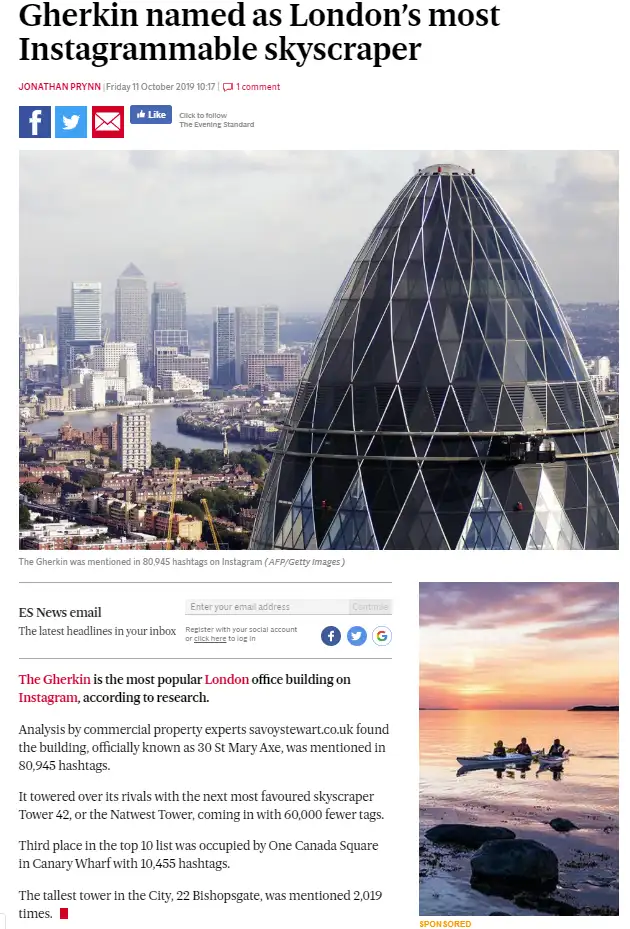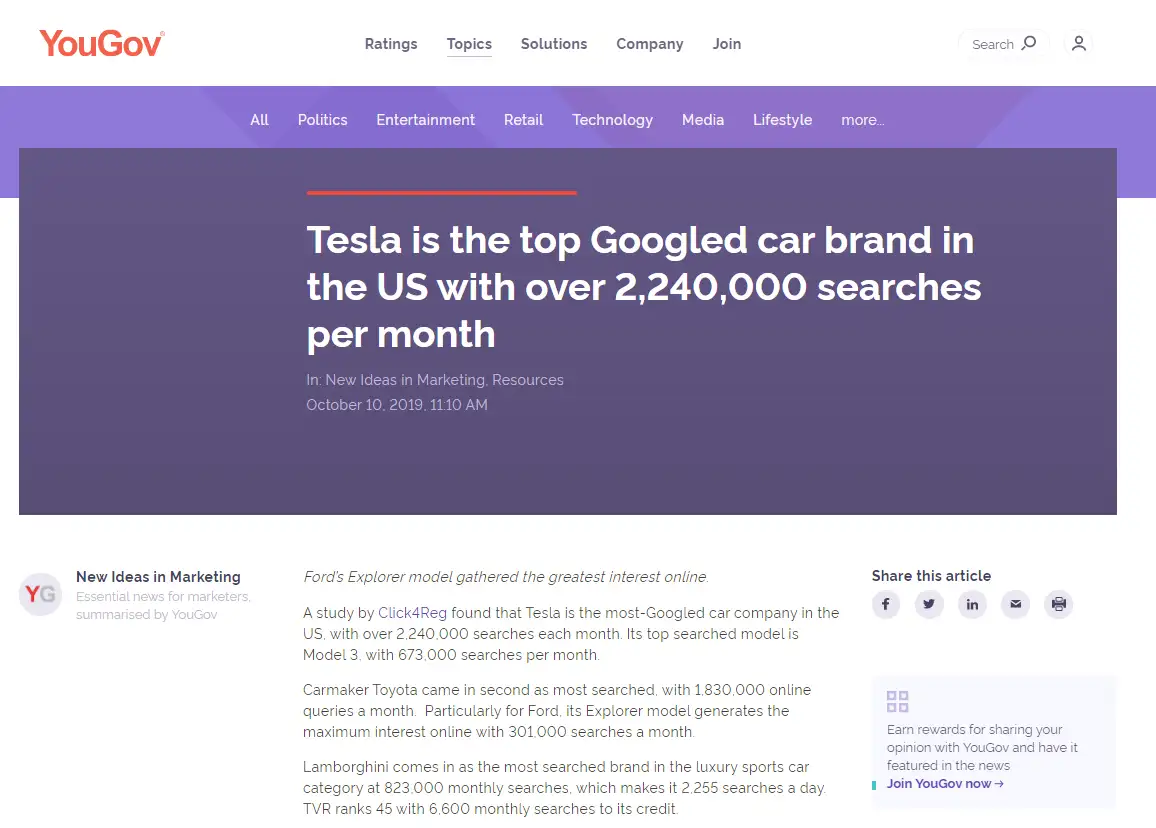
Link Building: Relevance vs. Authority. What’s more important?

Link building isn’t black or white. It’s an ongoing debate of right from wrong. What can be agreed is that organic link building is the best possible practise to ensure your website establishes itself as a dominant player and ranks well for desirable keywords.
What cannot be argued is that Google has always stipulated the undeniable importance of backlinks.
However, it begs the question of whether you should strive for quality over quantity/relevance or authority?
Hypothetically, you would assume authority wins every time, but many arguments illustrate that authority is merely a vanity measurement – meaning there’s a lot more to securing organic editorials which include a link. Ultimately, as SEOs, we may be able to determine the “healthiness” of a website, assessing metrics of technicalities, but at the very core of authority sits Google; an entity that doesn’t want us to know exactly how they measure authority and so we continue to speculate on ambiguities.
What’s the difference between authority and relevancy and what’s more important?
 Authority
Authority
When a website links to you, it instantly becomes a positive vote of confidence – indicating to algorithms that the website linking to you - trusts you, trusts your information and perhaps alludes to a relevancy of some kind. This is perhaps the easiest way for Google to evaluate reputation.
The number and variety of backlinks targeted to a website allow search engines to interpret how well a website is being optimised, what the information onsite is about and if the user will find it useful – indicating good or bad bounce rates.
Authoritative and relevant backlinks can build brand exposure
Ideally, the crème de la crème of link building in an organic way is to attain a backlink from a website that is the perfect combination of relevancy and authority.
 Relevancy
Relevancy
The clue is in the name. Determining relevancy is a pretty obvious indicator that if the website linking to yours and vice versa is of the same subject, or near enough to, then the backlink rewarded will carry a lot more depth and credibility. Google loves nothing more than authority when highlighting relevant information, and so a relevant backlink not only highlights a speciality, but it also suggests that you are knowledgeable about the information you provide; proving you’re a leader in what you do.
For example, we conducted several digital PR campaigns for our private plates company Click4reg. Although digital PR blurs the lines between technical SEO and creative PR, our campaigns were produced to ensure we continually kept up with changing laws and debates surrounding British motorists. This naturally helped us tap into a large-scale market of drivers, resulting in a vast variety of backlinks from highly authoritative and relevant publications.
Backlinks from What Car and Auto Express are the kind of links that truly benefitted our client in the long run in the SERPs and the kind of links you should be chasing.


What about national newspapers, or publications without a dedicated topic of interest?
National newspapers, regional newspapers and news bulletins spring to mind when exploring relevancy and authority as a combined unit – and it is a grey area.
At first glance, links earned on websites such as The Sun, The Mail Online, Cosmopolitan and Marie Claire who have extremely high DAs, only naturally becomes a competitive space for digital PR specialists and SEOs to achieve links from. It can be incredibly tough to rank without authority, and to an extent Google places a high importance on authoritative websites which drive a tremendous number of referrals and traffic and have a lot of high-authority outgoing and inbound backlinks.
Arguments in favour of authoritative backlinks claim half of the battle is in the outreach, and to achieve a high-authority link is far harder than on a website with a lower DA score that could be more relevant, but less important impactful.
For example, we often secure placements in national press for our clients such as The Evening Standard, who recently published our research revealing the most Instagrammable skyscraper office buildings in London.
 Although the article does not sit on a dedicated site of topical relevancy, links such as these add credibility to a client as a business and their field of interest – elevating their image as an authoritative figure, writing about their chosen field of interest.
Although the article does not sit on a dedicated site of topical relevancy, links such as these add credibility to a client as a business and their field of interest – elevating their image as an authoritative figure, writing about their chosen field of interest.
And what’s more, large scale sites such as Forbes have a vast audience, which means high levels of traffic.
Traffic = eyes, and eyes = traffic.
One example of this, is our recent placement on YouGov - a leading market-research firm. YouGov published our research detailing the car brands with the most Google searches. Although, YouGov’s main topic of interest is “Society and Government”, it is an indisputable source of information for individuals looking to include information which may support an article they are currently working on.

Content of this type will naturally attain links over time without having to do further outreach, as journalists can source and cite statistics provided by research such as this, meaning the content is referable and perhaps “evergreen”.
Be cautious not to overdo the number of powerful backlinks derived from sites without relevancy to your website. Although, most SEOs can agree that authoritative backlinks highlight many positives, Google can, and does sometimes ignore low relevance links. You must always try to have a balance of relevant/and high authority backlinks which serve to complement each other.
Not to mention, if your PR campaign is outreached effectively and you gain more on-topic links, this will no doubt generate better targeted traffic. The goal is to draw in users that are genuinely interested in the content they are reading - ultimately converting customers.
